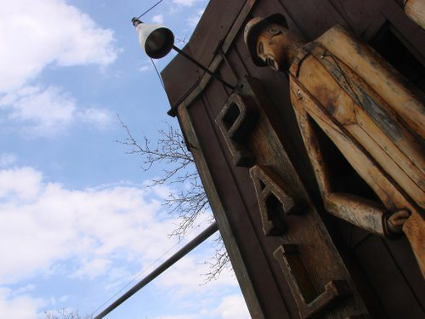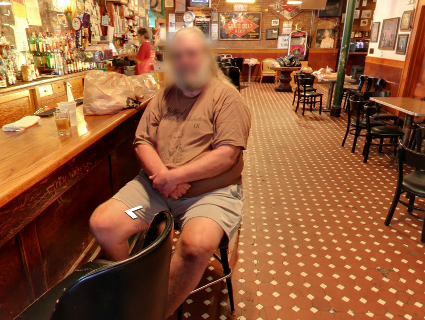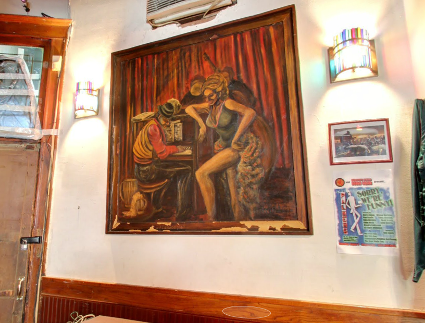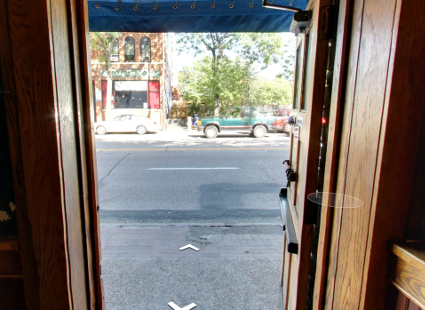The Google is Coming From Inside Your House
A weird thing happened to me today while I was wandering the streets of Minneapolis on Google Street View. While looking at the street where the New Year's Day apartment fire occurred, I found a photo of this interesting building sign:
After some searching, I located the sign outside a charming looking dive called Palmer's Bar. I was moving the view around to get a better look when I somehow ended up inside the bar.
Google had sent its reality-indexing cameras inside the building.
First, I encountered a patron sitting on a barstool whose privacy algorithm blurred face didn't hide his look of amusement.
I brushed past him and sauntered over to the piano in the corner, spotting an artwork that looked like something J.J. Evans might have painted on the '70s sitcom Good Times.
After checking out the interior like a building inspector -- there's some possible water damage on the ceiling -- I found my way back outside through the door.
The bar has been crawled with Indoor Google Maps, another technological marvel from the search giant that is equal parts amazing and terrifying. The feature has been around since 2011, apparently, but I didn't know about it until I stumbled into a bar.
When Men Defend a Sexual Harasser
The techblogger Dave Winer has a piece up on Scripting News defending Bora Zivkovic, a prominent science blogger at Scientific American and conference organizer who appears to be a serial sexual harasser of younger women he meets in a professional capacity.
In recent days three women have come forward with first-hand accounts of how Zivkovic treated them: Monica Byrne, Hannah Waters and Kathleen Raven. They allege that he had a skeevy habit of steering conversations to sexual subjects without prompting and volunteered that his wife wasn't having sex with him. The womens' stories are long, plausible and sad. A quote Raven offers from one of his emails captures the creepiness quite nicely:
... for you probably everything physical is sexual and in a negative way. Both last year and before/after, if I kissed your lips or grabbed your ass, you'd have freaked out! I'd mean it in a totally friendly nonchalant kind of way -- as a non-sexual act even at the time when I wanted you -- but you'd understand it very differently.
Obviously we're only getting part of the story here. But if you're telling a woman you want to bang that it bothers you when your ass grabs aren't viewed "as a non-sexual act," you're extremely committed to a manipulative game where you fish for attractive young sex partners while maintaining plausible deniability in case they take offense. Either that, or you get your jollies making women uncomfortable with sexually inappropriate conduct while getting away with it. (Hey, Anita, is that a pubic hair on my Coke can?)
When Byrne named Zivkovic as her harasser recently -- she'd originally blogged about the experience last year without identifying him -- he responded, to his credit, that her accusations were true. "I am very ashamed of this incident which happened more than a year ago," he blogged. "It was a difficult time for me personally and I made a mistake -– I should not have shared my personal issues with her. It is not behavior that I have engaged in before or since."
But to his discredit, it doesn't appear to be isolated behavior at all.
I avoid blogging about Winer these days, since nobody needs to hear what I think about the tool who once threatened to sue me, but I thought there ought to be some pushback to his piece, which expresses copious sympathy for Zivkovic while showing none for his accusers. "[A]ll his actions could be clearly seen as desperate cries for help," Winer writes. "Something really bad happened in Bora's life, and he hasn't dealt with it, so it's coming out in destructive and confusing ways."
As people misguidedly sprang to Zivkovic's defense, the claim he never did it to anyone else made the other accusers angry enough to come forward. In a spectacular example of misplaced priorities, the science writer and professor Andrew Maynard, despite not knowing Zivkovic personally, sent Byrne an email urging her to stop naming him as her sexual harasser. Noting that Zivkovic is "highly respected within his community," Maynard asked her to show him "consideration and compassion."
The people deserving of our compassion are the women he was creeping on. As more came to light, Maynard recognized that he'd made a huge mistake in pestering one of them to salvage Zivkovic's reputation. He updated his blog entry with this comment: "If I had the smallest fraction of the information I now have on Monday, I would never have emailed Monica."
I don't understand why any man would find more common ground with a professionally successful sexual harasser than with the younger, less powerful women he allegedly mistreated. Something really bad happened in these women's lives, too, and he's not the sympathetic figure in this sordid little tale.
Jonathan Franzen Also Hated Mac Dude
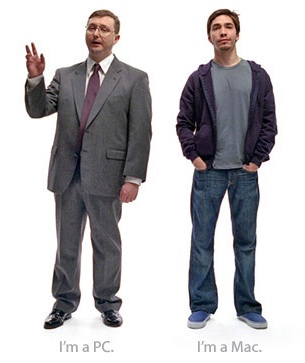
A few years ago, in one of Apple's last big marketing campaigns while Steve Jobs was alive, the company mocked Microsoft by having Justin Long portray a Mac and John Hodgman a PC in TV commercials. Long's comfortably scruffy dude in sneakers was supposed to be cool, while Hodgman's pudgy businessman was supposed to be a dork who couldn't quite catch up to the times.
I wrote in 2007 that the commercials were doing something for Microsoft it couldn't do for itself -- make the company lovable.
The Mac hipster played by Justin Long is insufferably smug compared to his problem-plagued comic foil, who ends up looking like a well-intentioned underdog unruffled by adversity. He's like Charlie Brown, falling over and over for Lucy's promise to let him kick the football. ... When I spot one of those commercials as I'm blipping through Tivo, I stop to see how Hodgman fares.
As my link shows, Hodgman wasn't rooting for himself either. The Daily Show contributor called his character "delusional" for believing he was cooler than a Mac.
In a piece for The Guardian about his new non-fiction book The Kraus Project, the author Jonathan Franzen reveals himself to be another person who hated Mac Dude:
Any chance that I might have switched to Apple was negated by the famous and long-running series of Apple ads aimed at persuading people like me to switch. The argument was eminently reasonable, but it was delivered by a personified Mac (played by the actor Justin Long) of such insufferable smugness that he made the miseries of Windows attractive by comparison. You wouldn't want to read a novel about the Mac: what would there be to say except that everything is groovy? Characters in novels need to have actual desires; and the character in the Apple ads who had desires was the PC, played by John Hodgman. His attempts to defend himself and to pass himself off as cool were funny, and he suffered, like a human being. (There were local versions of the ad around the world, with comedians David Mitchell and Robert Webb as the PC and Mac in the UK).
Subscribers I Lost When Google Reader Died
Back in July, I noted how many RSS readers my sites had. I figured that the July 1 closure of Google Reader, by far the most popular feed reader used by my visitors, would show up in the stats at some point and I wanted to quantify the change.
The subscriber numbers didn't drop for a long time, but it appears they finally are reflected in the analytics on FeedBurner, the service I use to deliver feeds.
Here's the past and current RSS reader counts for my sites and the percentage drop:
- Drudge Retort: 15,449 subscribers in July and 9,454 today, a 39 percent drop.
- Workbench: 1,242 subscribers in July, 1,060 today (15 percent drop).
- SportsFilter: 687 subscribers in July, 513 today (26 percent drop).
Though it's obviously a bad thing to lose a lot of feed subscribers, it's not clear how many of them were actively using Google Reader to follow my sites on a regular basis. Having a subscriber doesn't mean anything if that person isn't reading the feed.
I like RSS and use it often as a publisher and a user, but I expect feed reading to continue to decline and for more sites to offer no feeds at all. Social networks are the way most people find and share things these days. Plodding through a bunch of full-text feeds in reverse-chronological order, as if they were one giant blog, is too much effort for most people.
Though new readers may emerge that make feeds more of a social experience, or reinvent RSS in some unexpected way, the best days of RSS are behind it.
Two Tragic Stories of Death From Overwork
 Moritz Erhardt, a 21-year-old intern at Bank of America Merrill Lynch in London, died recently as he neared the end of a seven-week summer internship. He'd been working a grueling schedule in an investment bank division that was "notorious for the hours workers are expected to clock in," writes Ruth Margalit of The New Yorker.
Moritz Erhardt, a 21-year-old intern at Bank of America Merrill Lynch in London, died recently as he neared the end of a seven-week summer internship. He'd been working a grueling schedule in an investment bank division that was "notorious for the hours workers are expected to clock in," writes Ruth Margalit of The New Yorker.
Friends said Erhardt had been keeping enormously long hours -- working all the way to 6 a.m. three days in a row shortly before he collapsed in his shower -- leading to speculation that the ambitious business school student worked himself to death.
The idea of a young white-collar employee dying from overwork was novel enough for the story to become news across the world, but it's one I've been familiar with since hearing about Yale Jared Weiner 18 years ago.
Weiner was a lawyer who died in 1995 at age 27. He had a pre-existing heart condition and the huge workload he was under at his law firm was too much for him. I remembered him because of a page created in his honor by Rebecca Eisenberg shortly after he died. Eisenberg, an influential early web writer and essayist, wrote this in tribute:
on october 31, 1995, one of my best friends and favorite persons in the world, yale jared weiner, passed away at age 27. yale was a truly good, kind and generous individual, always eager to place the needs and interests of other people before himself, and always able to see the silver lining in even the most seemingly hopeless situations. yale had a unique ability to cheer people up with his cynical sarcasm, corny humor, and somewhat nihilistic philosophies.
I don't think I knew Eisenberg yet back then, except as one of the seven cast mates on an online version of the Real World called GeekCereal that an online community called Cyborganic created and then shuttered, long before it could have been snarfed up by the Internet Archive to be used against them later. (I got to know her through Michael Sippey, who's like a platonic matchmaker for early web nerds.) Today, Eisenberg's better known for her work as the general or senior counsel at Reddit, Trulia, AdBrite and PayPal and as a founding board member of Craigslist.
Her friend's tragic story stuck with me because when he died, I was in my twenties and still in the phase of life where you could believe yourself indestructible. I worked too much, slept too little and (most importantly) drank too much, then got up the next day and did it again. I also lost a friend to a heart ailment at age 27 in 1995. Matt Anderson, my coworker at the Denver interactive TV startup Zing Systems, collapsed and died on a basketball court of an undetected problem related to mitral valve prolapse.
If you're reading this in your twenties, please keep in mind that you are not indestructible.
Dear Students, My Job is to Kill Your Dreams
When the novelist Kelly Braffet was in high school, she had the worst English teacher of all time:
One day, Mrs. Smith told us to write about what we wanted to be when we grew up. I wrote about wanting to be a writer. I wrote about how I'd loved books as long as I could remember and was never happier than when I was deeply immersed in a story. I probably added something about wanting to win the Pulitzer by 25 and the Nobel by 30, because that was the kind of obnoxious kid I was. I didn't really know anything about either except that winning them would be good, but I was young, and I had big dreams. That's what being young is about.
When this paper was returned, she'd written the following: "I used to want to write mysteries, but as I grew older, I realized it wasn't possible. Eventually you'll find a more realistic goal."
Mrs. Smith was the wind above her wings.
Escape the Walled Gardens with ZTE's Firefox Phone
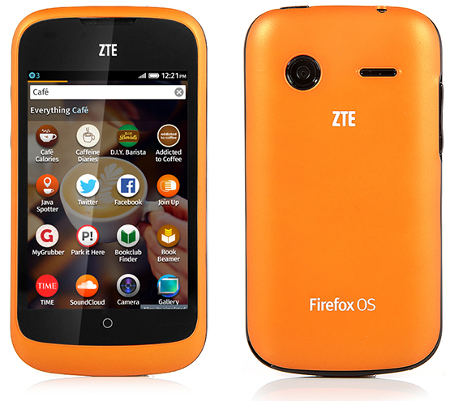
On Friday, the Chinese smartphone manufacturer ZTE's eBay store will be selling the first phone in the U.S. that runs the new Firefox OS. The $80 ZTE Open will be unlocked so that customers can sign up to any carrier and use apps that run without installation.
Firefox OS is an open source operating system built atop a Linux kernel. Apps are implemented with HTML5, Javascript and other open web standards, so any website designed to function as an app will work. In a mobile environment completely dominated by Apple and Google, this is an attempt to pry loose their stranglehold through open web standards and unrestricted data-sharing among apps.
There is an official Firefox Marketplace, but it's not the only way apps can be distributed. Other providers can set up marketplaces and apps can even run without installation at all.
Firefox executive Jay Sullivan covered the basics of Firefox OS in a short video. One innovative feature is how user searches can make apps available even when they're not on the device. He demonstrated how a search for the movie Skyfall presented apps for IMDB, Fandango, Netflix and other movie-related services. "My phone immediately transforms itself. Now it's all about movies," he said. "What's interesting is that I may never have seen those applications before. They're shown to me in real time based on what I care about."
Andy Boxtall of Digital Trends writes:
... it's hardly a spec powerhouse, and with a 1GHz single core chip, a 3.5-inch screen, 3.2-megapixel camera, and 256MB of RAM, it's nobody's dream phone. It does have GPS, 3G connectivity, a microSD card slot, and Wi-Fi, so it's by no means useless.
I'm a late adopter on mobile programming, so I have no idea whether a carrier deal might be cheap enough to make it worthwhile to buy one of these to experiment on. But as someone who loathes the walled garden model for software distribution, where a central authority like Apple decides whether your app or content is allowed to run on its device, I'd love to see phones that act more like the web. In 18 years, I've never needed anybody's permission to publish a website or offer software that runs on desktop computers. I want that freedom on my phone.
